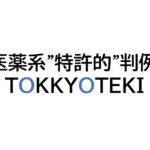臨床試験(clinical study)は公然実施(public use)?: CAFC Docket No. 2007-1414, -1416, -1458, -1459 (In re omeprazole patent litigation)
Astrazenecaが販売するPrilosecの有効成分omeprazole(オメプラゾール、プロトンポンプインヒビター)製剤をカバーする特許に関するANDA訴訟。
いくつかの争点のうちのひとつとして、本件特許出願前1年を超えて前に、本件特許発明である製剤を用いてPhase IIIの臨床試験が開始されていた(public useとなっていた)ことを理由に、原告(Impax)は、Astraの本件特許は102(b)に基づき無効とされるべきものであると主張した。
地裁は、下記2つの観点からImpaxの主張を退けた。
First, the court ruled that the studies constituted experimental uses, and therefore not public uses, of the claimed invention.
Second, the court ruled that the patented formulation was not ready for patenting until after the studies were completed.
【要旨】
CAFCは、上記地裁判断の1点目についてImpaxを支持した。
We agree with Impax that the district court misapplied this circuit’s law with respect to the experimental use exception. The district court found that, even if Astra’s formulation had been reduced to practice before or during the clinical studies, the studies were experimental and therefore negated the public-use bar to patentability. Impax correctly points out, however, that it is clear from this court’s case law that experimental use cannot negate a public use when it is shown that the invention was reduced to practice before the experimental use.
つまり、
「”reduction to practice”に至ったのであればその後は”experimental use”を主張することはできない。」
のであって、
「たとえ臨床試験前に発明の”reduction to practice”に至っていたとしても、臨床試験は”experimental use”である(つまり、public useの適用除外である。)、という地裁のロジックは不適切である。」
と判断したようである。
しかしながら、CAFCは、上記地裁判断の2点目については、地裁判断を支持した。
The district court found that the claimed formulation was not reduced to practice before the clinical trials were completed, and we uphold that finding.
…
The district court found that the Phase III formulation was not reduced to practice before the trials because the evidence showed that at that time the inventors believed only that the formulation “might solve the twin problems of in vivo stability and long-term storage.” The district court found that “the Phase III formulation still required extensive clinical testing and real-time stability testing to determine whether it could treat gastric acid diseases safely and effectively.”
…
Impax’s challenge to the district court’s finding begins with its assertion that the Astra scientists had conceived and produced the Phase III formulation before the clinical trials. It is not disputed that the Phase III formulation had been produced before the trials. The existence of the formulation, however, does not establish that the Astra scientists had determined that the invention would work for its intended purpose.
つまり、
「Phase III開始前に、本願発明であるPhase III製剤が存在したとしても、その発明がその意図通りにin vivoでworkするかどうかを確かめるまでには至っていなかった(つまり、臨床試験をやってみないとわからない)ので、臨床試験前に本願発明の”reduction to practice”が完了していたということはできない。」
と判断したようである。
結論として、Astraの臨床試験行為はpublic useに該当しない(102(b)による無効ではない)と判断した。
【コメント】
臨床試験(clinical study)が公然実施(public use)に該当するのかどうかが争点となった興味深いCAFC判決。
Public useの除外規定である”experimental use”に関しての考え方は、以前と変わりないようだが、一般的な概念として、また具体的な各発明ごとに当てはめた場合における”reduction to practice”とは何なのか、整理される必要があるように感じる。
特許保護期間を最大化するためにライフサイクルパテントの出願時期を臨床試験開始後に遅らせる戦略をとる場合、公然実施(public use)を理由に新規性なしとの攻撃をされないためにも、その発明が臨床試験結果によって初めてwork するかどうか判明する類のものなのかどうかを検討する必要があるだろう。
参考:
Wikipedia: Omeprazole
臨床試験と公然実施(public use)に関するCAFC判決↓



コメント